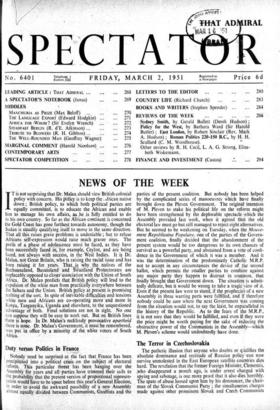Duty versus Politics in France
Nobody need be surprised at the fact that France has been precipitated into a political crisis on the subject of electoral reform. This particular threat has been hanging over the iissembly for years and all parties have trimmed their sails to the probability that the present version of proportional represen- tation would have to be upset before this year's General Election, in order to avoid the awkward possibility of a new Assembly almost equally divided between Communists, Gaullists and the parties of the present coalition. But nobody has been helped by the complicated series of manoeuvres which have finally brought down the Pleven Government. The original intention of M. Pleven to stake his political life on the reform might have been strengthened by the deplorable spectacle which the Assembly provided last week, when it agreed that the old electoral law must go but still managed to reject eight alternatives. But he seemed to be weakening on Tuesday, when the Motive- ment Republicaine Populaire, one of the parties of the Govern- ment coalition, finally decided that the abandonment of the present system would be too dangerous to its own chances of survival as a powerful party, and abstained from a vote of confi- dence in the Government of which it was a member. And it was the determination of the predominatly Catholic M.R.P. not to accept in any circumstances the device of the second ballot, which permits the smaller parties to combine against any major party they happen to distrust in common, that finally brought that Government down. The situation is admit- tedly delicate, but it would be wrong to take a tragic view of it. Even if the present law were to stand, if the prophecies of a new Assembly in three warring parts were fulfilled, and if therefore nobody could be sure where the next Government was coming from the situation would not, to say the least, be unparalleled in the history of the Republic. As to the fears of the M.R.P., it is not sure that they would be fulfilled, and even if they were the price might be worth paying for the sake of reducing the obstructive power of the Communists in the Assembly—which M. Pleven's scheme would undoubtedly have done.


































